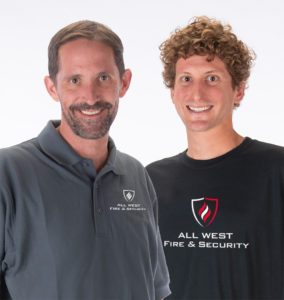The vast majority of Americans aged 65 and older, about 90%, say they want to continue to live in their own homes as they gain in years.
Sandy: Summertime, summertime, sum-sum-summertime! Warm, then hot, then blistering hot, and hotter. And let the monsoons pour!
Tom: Sounds counterintuitive, but I agree, let’s hope the monsoons, as our summer rains are known, make a long-lasting appearance this year.
Sandy: Everything is so dry. This might be a good time to remind our readers about being Firewise. To our readers, please check with our local fire departments to find out what the fire regulations are. And when towing a trailer, make sure those tow chains do not drag. It is so easy to cause a brush fire with those dragging chains and the sparks they create.
Tom: Great point. What will we talk about this month? What are your most frequent calls these days?
Sandy: Well Tom, I receive all kinds of calls. The cutest call I received last week was from an elderly woman. She wanted to adopt a doggie and wanted my help on where to go to find one. Her current dog was 17 years old and is in failing health. She wanted a new medium-sized dog to bring into the home before her current doggie crosses the rainbow bridge. The Yavapai County Humane Society only had small dogs, so I told her I would make a few phone calls on her behalf. Other than the dog adoption call, I have had numerous calls from homeowners, the elderly, precious seniors, who are trying to decide if they should stay in their home as they age. It is a dilemma and can be pretty daunting if they don’t have good information.
Tom: So very true. As an architect, I have spent quite a bit of time using the Americans with Disabilities Act information as part of what we can apply to what the industry calls “aging in place.” There are two questions folks need to ask themselves regarding staying in their home or moving to other locations.
Sandy: I bet the first questions should be: “Are they comfortable where they are currently living? Do they know the neighborhood and the neighbors? Are they close to services?” Things like that.
Tom: Spot on, Sandy. Those are the key first questions. If the answer is no here, then moving to an incorporated, all-encompassing living facility that can better support their needs makes sense.
Tom: If the answer is yes, well then, we suggest looking around to see what changes or improvements might be needed in order to make aging at home a bit simpler and easier and less stressful.
Sandy: I would venture to say that changes in the bathroom would be first and foremost for ease and convenience and, of course, safety. I receive so many calls to remove the bathtubs and install walk-in showers with shower seats and grab bars. Many families want showers without curbs to support wheelchairs. Getting in and out of a tub can certainly be a challenge for folks with mobility issues. What is some of your sage advice here?
Tom: Yup. That’s a great place to start, as that room ranks as the most accident-prone space in the home and the most dangerous part of this room is the tub/shower.
In an ideal situation, we would remove the tub and replace it with a zero-entry shower. That is a shower that has no curbs.
Sandy: No tub, no curbs, that certainly reduces a major tripping hazard. With a seat in the shower and a handheld faucet, many issues could be solved.
Tom: We also recommend having a floor surface that is non-slip. While mats can help that, they can also move.
Sandy: What if someone want to keep their tub? Can you install grab bars to help?
Tom: Yes. We would install at least three. One vertical bar at the entry point to help stabilize the movement over the tub’s edge. A second would typically be on a 45-degree angle along the long wall of the tub. This facilitates sitting down, and if you are standing, the angle helps catch you if you fall. The third one is horizontal just above the faucet or tub filler. This helps sitting up and preparing to stand.
Sandy: What other modifications do you see most often when converting a bath for the elderly or, for that matter, someone who is in a wheelchair or has health challenges?
Tom: The vanity sink faucets could be replaced from the turning type to a paddle design.
Sandy: The ease of the on and off is pretty apparent. I would think this would apply to the kitchen sink as well.
Tom: Yes, and door handles. But one more item in the bathroom before we move on: the toilet. At least trade out for what is known as a “Comfort Height” water closet if not an outright handicapped height. The increased height is what helps. Grab bars in this area help as well.
Sandy: So that could be four or five grab bars in a single bathroom, and I know they are worth their weight in gold the one time you need them and those that get used every day for safety assistance.
Tom: Yes, they are.
Sandy: So, move us on to the rest of the house. What room is next?
Tom: Let’s talk kitchen. You mentioned the paddle handles for the sink. That is important. The other aspect of the kitchen’s usability are the cabinets.
Sandy: Upper shelves can be hard to reach and keeping the most used items on the lower shelves is the smart thing to do here. Heck, I already do that, and pull-out shelving is awesome!
Tom: Great! We like to recommend installing pull out drawer shelves for the lower cabinets. Sandy, we are on the same page. Often a good cabinet shop can retrofit your existing cabinets with these back-saving devices.
Sandy: How about counter space? Moving pots and pans around can be difficult if the counters are too far from the cooking surfaces or the refrigerator.
Tom: Yes. A couple of things here: One, there should be a minimum 18” to 24” of counter on each side of a cooking surface; and two, there should be at least one counter near the refrigerator and pantry. The other back-saving modification would be to have the oven with its racks about counter height and the same with the microwave.
Sandy: Lifting in and out of those necessary appliances can be an issue. There are other household simple modifications that can be made to help stay in your home – things like area or throw rugs are tripping hazards and lighting needs to be brighter. That could be as simple as changing a bulb.
Tom: You are correct. There are a lot of the things that can be done to make your home safe and comfy for years to come.
Sandy: And a lot of those things can be DIY! How cool is that, Mr. Renovations?
The vast majority of Americans aged 65 and older, about 90%, say they want to continue to live in their own homes as they gain in years. Many seniors are worried about their financial futures. Approximately 15% of seniors surveyed by the AARP say they are not confident their finances will last through their retirement years and 8% have no financial plan for retirement. The good news that we shared with you in our column this month is that these changes that make your home safe will not break the bank.
Tom: For our readers, Sandy, while it seems simple to remain in their home, it is possible that homeowners will need to make some adjustments to their daily routine or even make some modifications to their home as they age, such as the modifications we discussed. With some research and helpful resources, anyone can find ways to make aging in place safer and more convenient.
Thanks, readers, for stopping in and reading “At Home with Tom and Sandy.” You’re in good company and we love sharing educational, fun and important information with you.
Until next month! QCBN
Tom Reilly, Architect, 928-445-8506
Sandy Griffis, Executive Director, Yavapai County Contractors Association. 928-778-0040.












